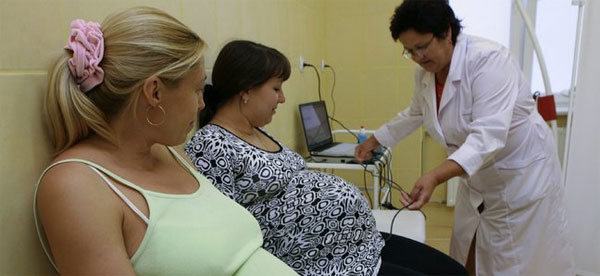Equipment for continuous monitoring of fetal development
Russian scientists are studying the manufacture of monitor devices that allow detecting the smallest commands in the big process of the fetus to help doctors promptly intervene and adjust. The ongoing monitoring of the mother's pregnancy will not adversely affect the future child.
Today, medicine has the ability to monitor the health status of children in the womb through a variety of forms, but all are not very comprehensive despite the full application of all methods. Ultrasound examination, fetal heart recording - parallel recording fetal heart rate and intensity of uterine contractions, as well as listening to the fetal common heart rate and sampling analysis are all necessary tasks, but do not provide pictures Complete picture of the baby's health condition. Regular monitoring of a variety of operational aspects, including remote monitoring. Russian scientists have found a solution to help gynecologists indirectly monitor maternal health.

Doctor tested fetal monitoring device.(Photo: RIA Novosti)
Tomsk city engineers - a large scientific center in eastern West Siberia - are building special obstetric monitor devices . Tomsk's "Diognostika +" receives financial support from the promising Ministry of Education and Science for Device Inventors that can warn embryonic health abnormalities.
The obstetric monitor will analyze fetal growth properties by monitoring the biological indicators of the mother and baby's body. Examples include weight, fetal fetal height, cardiac activity, brain development and so on. Until now, ultrasound information was not completely safe for children's health and not yet able to perform continuously. The new tracking method has no limitations. The device is sensitive to all small changes but does not affect the health of the baby in the womb, "said Artem Bureev, director of " Diognostika + " .
In addition, the Russian obstetric monitor will be much cheaper than the Western device, which is not a medical facility in the country. In Moscow, the service continuously monitors the fetus up to $ 2,500, while the device itself produced by foreign countries is ten times more expensive - $ 25,000. Thus, only affluent families are able to use the service.
"In the meantime, if you miss the moment, the pathological process is likely to grow - Mr. Bureev noted - our invention helps doctors to take timely measures."
- Super fast water monitoring technique
- IntelligentM - sanitary monitoring equipment for the health sector
- Traffic monitoring equipment
- Vietnam manufactures equipment to monitor mobile radioactive sources
- Hand-held health equipment
- CliMate weather forecasting device
- Autism originates from brain changes in the fetus?
- Successfully manufacturing radiation warning equipment
- Equipment tiny blood tests under the skin
- Interesting association of fetal development through fruits
- Equipment to feel the machine
- A comprehensive health monitoring device
 Green tea cleans teeth better than mouthwash?
Green tea cleans teeth better than mouthwash? Death kiss: This is why you should not let anyone kiss your baby's lips
Death kiss: This is why you should not let anyone kiss your baby's lips What is salmonellosis?
What is salmonellosis? Caution should be exercised when using aloe vera through eating and drinking
Caution should be exercised when using aloe vera through eating and drinking